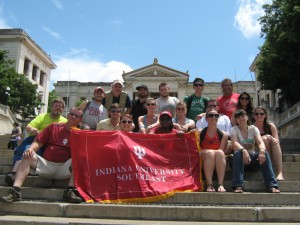NEW ALBANY, IN (July 25, 2012) – Sixteen Indiana University Southeast students and two professors traveled to Cuba in June as part of a study abroad opportunity.
They spent three weeks traveling the island country as the capstone of the Cuba in Transition course taught by IU Southeast Professor of Political Science Cliff Staten.
Students got to see all aspects of Cuba including the island’s politics, economy, society, culture, and foreign relations. They toured five Cuban cities including Havana, Santiago, and Santo Domingo, and they visited historical sites including the Bay of Pigs, Ernest Hemingway’s home, and the birthplace of Fidel Castro.
“We got to interact with Cubans at all different levels – the government, university, and commoners,” Staten said.
They took a bike ride through Havana and hiked in the Sierra Maestra to one of Fidel Castro’s former rebel base camps. They took salsa lessons and heard the legendary music ensemble The Buena Vista Social Club.
“I loved Havana, it’s not like anything else,” said Sean Welsh, a political science senior. “There’s an ambience there that you don’t get in the states.”
But they also learned about some of the cornerstones of a Communist society. His students, Staten said, all noted that Cuba is a much more complicated system than they previously thought.
“Textbooks paint Cuban politics as very black and white, when in reality it seemed a lot more gray,” Welsh said.
The IU Southeast contingent witnessed the Communist limitations on free speech and the lack of free press, Staten explained. While they – as tourists – were able to gain access to the Internet at their hotel, average Cubans do not have that luxury, he said.
They also saw firsthand the traditional way of handling justice in Cuba. While traveling across the country, their bus was stopped by police who patrol the highways. The driver had to pay a fine before they could continue on their way.
“The students could clearly see that people have limitations in due process,” Staten said.
One thing that also shocked the students was the amount of racial intolerance in the third world country. Victoria Bennett, international studies senior, personally experienced these challenges.
“The amount of racial inequality impacted me every moment of everyday,” Bennett, who is black, said. “I felt like I was either invisible or on display to everyone.”
Despite these circumstances, which weren’t expected by anyone, Bennett still managed to pull herself together and look past the negative aspects of their culture.
The students also noticed efforts to change. When Raul Castro assumed the presidency in 2008, he promised economic growth.
It’s happening – slowly – but everyday Cubans are eager for more, Staten explained.
“People were appreciative of the changes since Raul took over, but they said it needs to happen faster,” Staten said. “People were impatient with the economic change.”
For Staten, the trip certainly paid off as his students were able to grasp a better understanding of Cuban culture and government. In fact, he’s considering taking additional groups every couple of years.
“You can teach things in class and give them the macro view, but this opens their eyes to change,” Staten said. “It always expands the horizon to feel, touch, sense something you can’t do in the classroom.”



